Photos by Ariana Drehsler
As the late morning service begins at St. Luke’s Episcopal Church in San Diego’s North Park, the congregation’s songs reach through the floor to the commercial kitchen in the building’s basement.
There, a group of women in colorful head wraps and vibrant prints cook quietly, the silence occasionally broken by conversations in Arabic, Swahili and English.
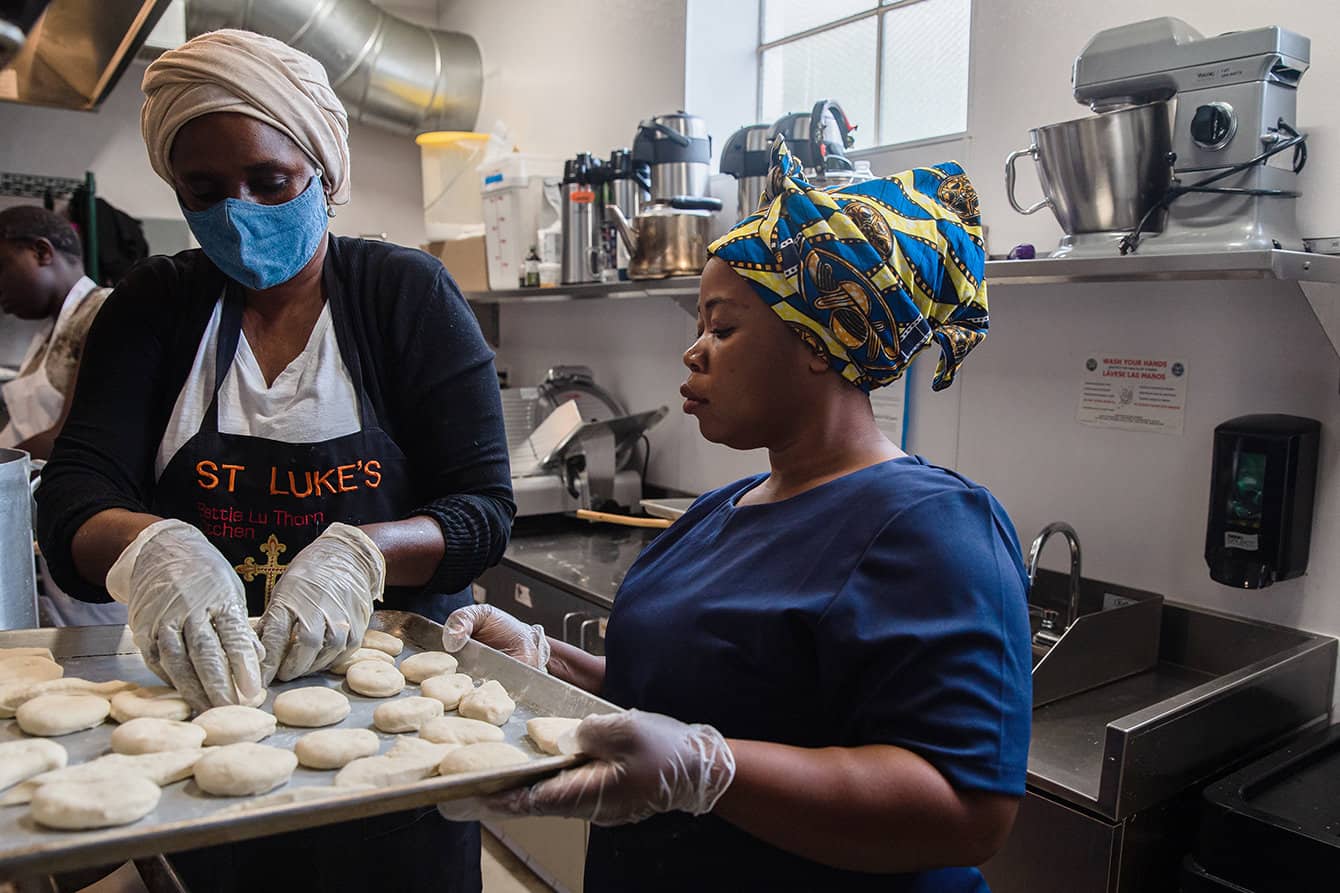
Near the kitchen’s main door, Sarah John flattens balls of dough with a rolling pin and passes them to her daughter, who fries them in a skillet to make chapati.
On the other side, Nadia Agory teaches Suzanna Simon to cut another mass of dough into small pieces. Agory then lays each piece in a deep fryer to make mandazi, which the women will put out with tea for churchgoers after the service ends.
Standing by the industrial sink, Mariam Abdelrahman cores zucchini that will later be filled with meat and rice as mahshi.
The women are part of Mama Africa Catering, the most recent endeavor launched by RefugeeNet, a nonprofit that grew out of St. Luke’s to support and empower refugee communities in San Diego.
What welcoming smells and creative labor can you envision wafting out of your church basement or campus?
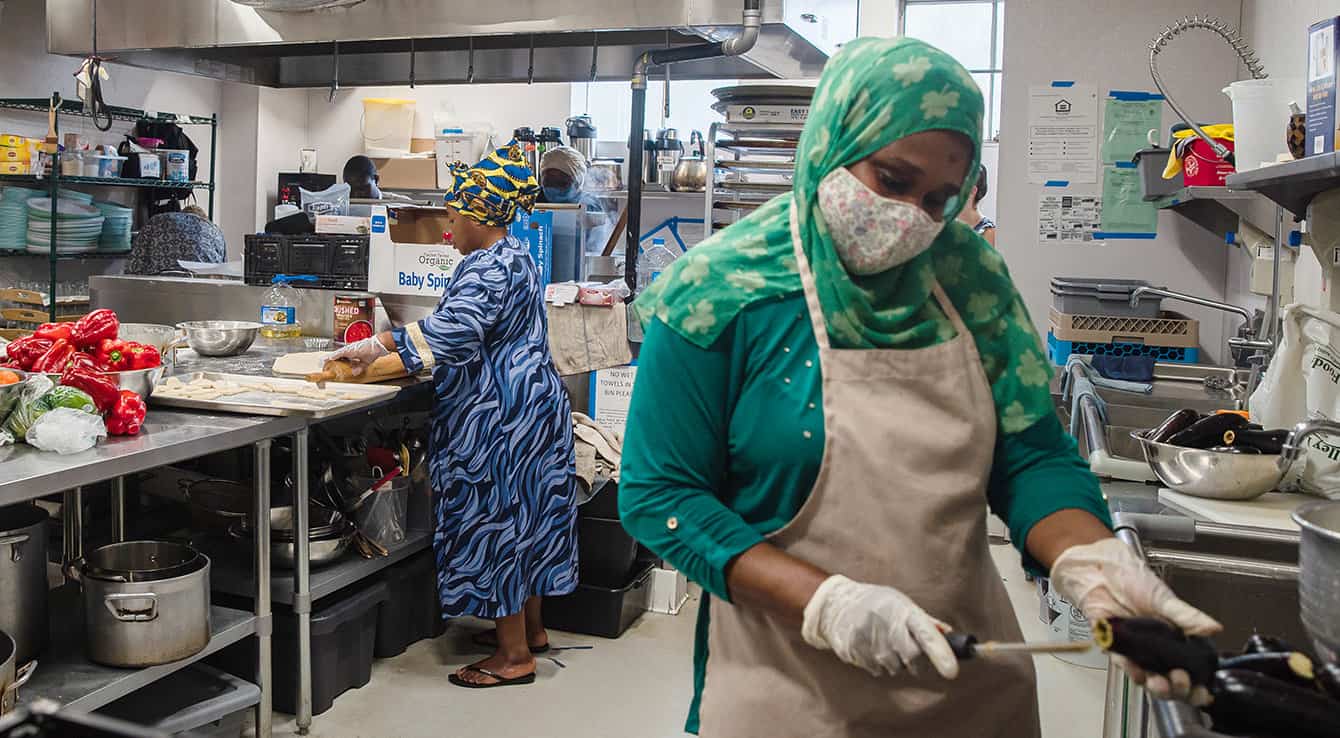
“It’s not about writing a check. It’s not about an arm’s length transaction of time or talent or treasure,” said the Rev. Colin Mathewson, co-rector at St. Luke’s. “It’s about sharing your lives.”
Refugees are people who have been forced to flee their countries because of fear of persecution and are generally identified through international screening processes. The United States resettles refugees from around the world each year after they’ve been screened in countries closer to home.
Refugee arrivals to the U.S. are expected to increase in the coming year, because the Biden administration has raised the maximum number that our country will admit. In addition, recently evacuated Afghans will soon be moving from military bases to cities across the country.
San Diego refugee resettlement agencies have been busy hiring staff to meet the coming demand for their services. Along with them, community groups that work to fill gaps in support for new arrivals are also busy planning.
“We don’t want any of these folks falling through the cracks,” said Mejgan Afshan, a prominent voice in San Diego’s Afghan community and co-founder of Borderlands for Equity. “We want people to be able to live and thrive like we have.”
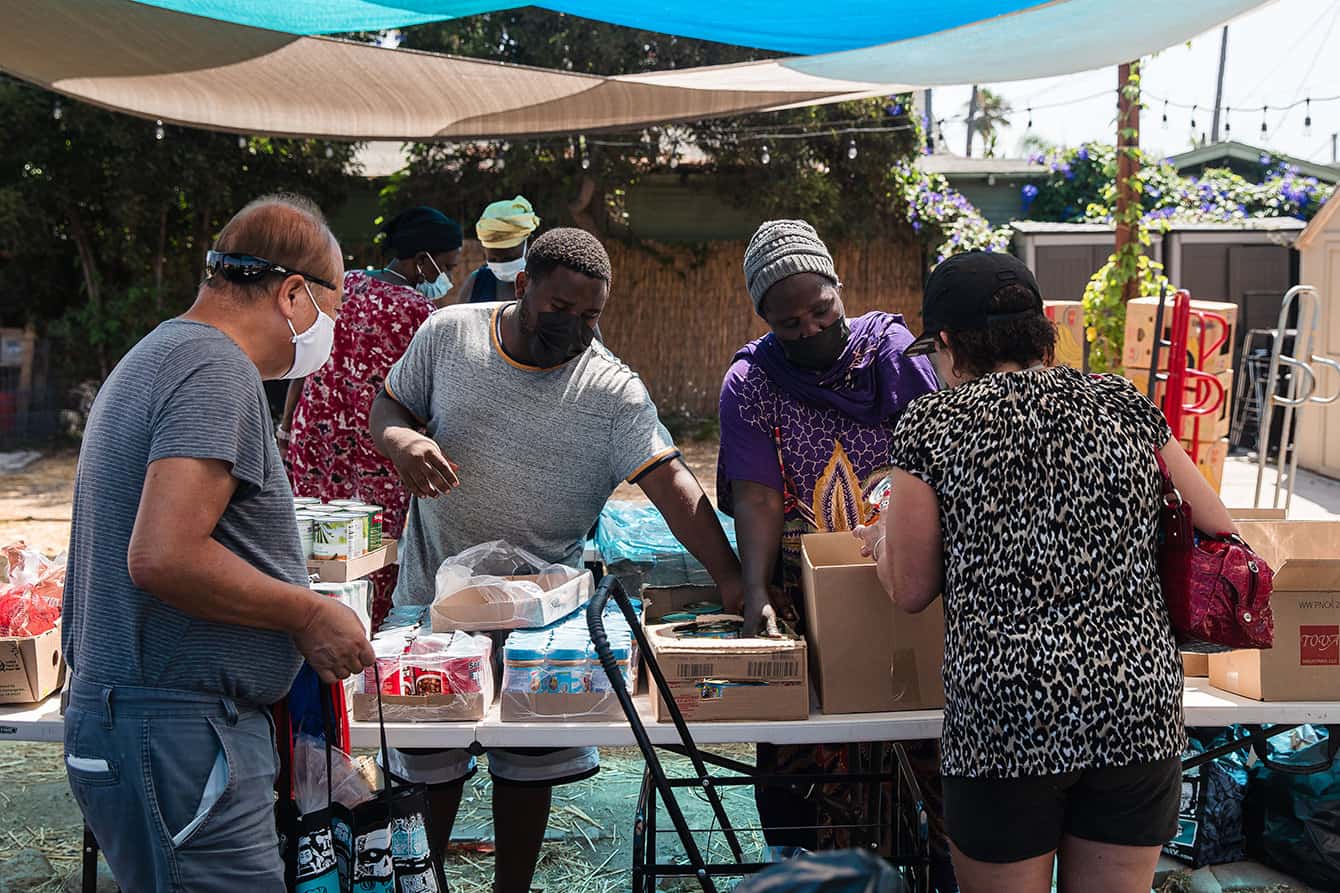
The work of RefugeeNet is particularly poignant for those involved, because the congregation at St. Luke’s is largely made up of former refugees from African countries who were themselves helped by the organization in its early days. They now feel that they are giving back to their community and sharing their blessings by passing that help along to newer arrivals.
“Seeing people of faith in the community, especially in the community of the Episcopal Church, helping those vulnerable people, it reminds me what the Bible says about welcoming those who are strangers into our houses, into our neighborhood,” said Michael Mawien, a former refugee from Sudan who is now bookkeeper for RefugeeNet.
“That actually strengthened my faith, to see God is working through those people, through Americans who are really putting all of their resources into helping this organization grow and helping this vulnerable population of people who are just arrived to the United States.”
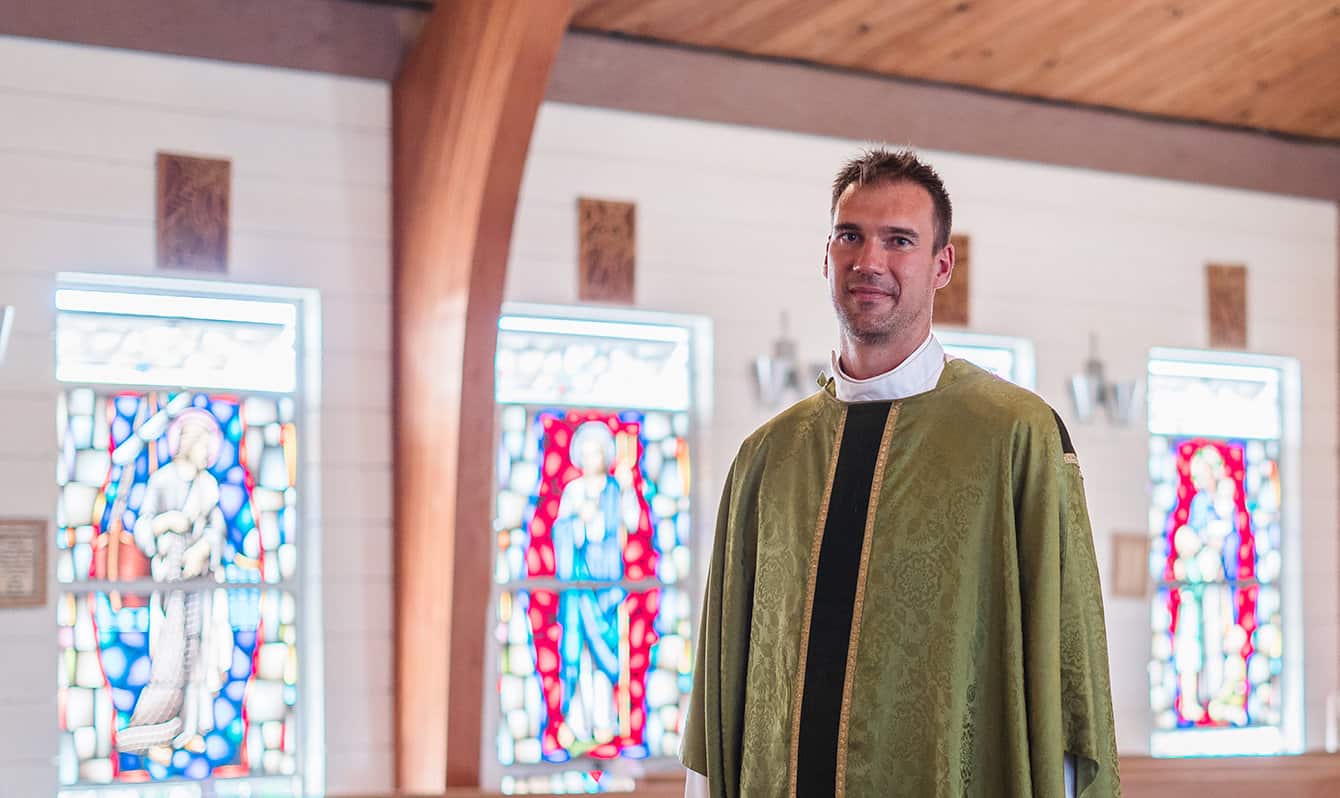
The shift in the church’s demographics is not lost on Matthewson.
‘We will fill this church’
The histories of St. Luke’s and RefugeeNet are closely intertwined.
In the early 1990s, the church was shrinking. Its congregation, made up at the time of mostly white San Diegans, was aging.
The Rev. David Montzingo, who now works as canon for clergy formation for the Diocese of Western Anglicans, became rector of St. Luke’s in 1991. At a retreat in early 1994, church leaders, noticing that the neighborhoods surrounding their church were becoming increasingly culturally diverse with residents from around the world, decided to adopt a motto inspired by Methodist movement founder John Wesley: “The world is our parish.”
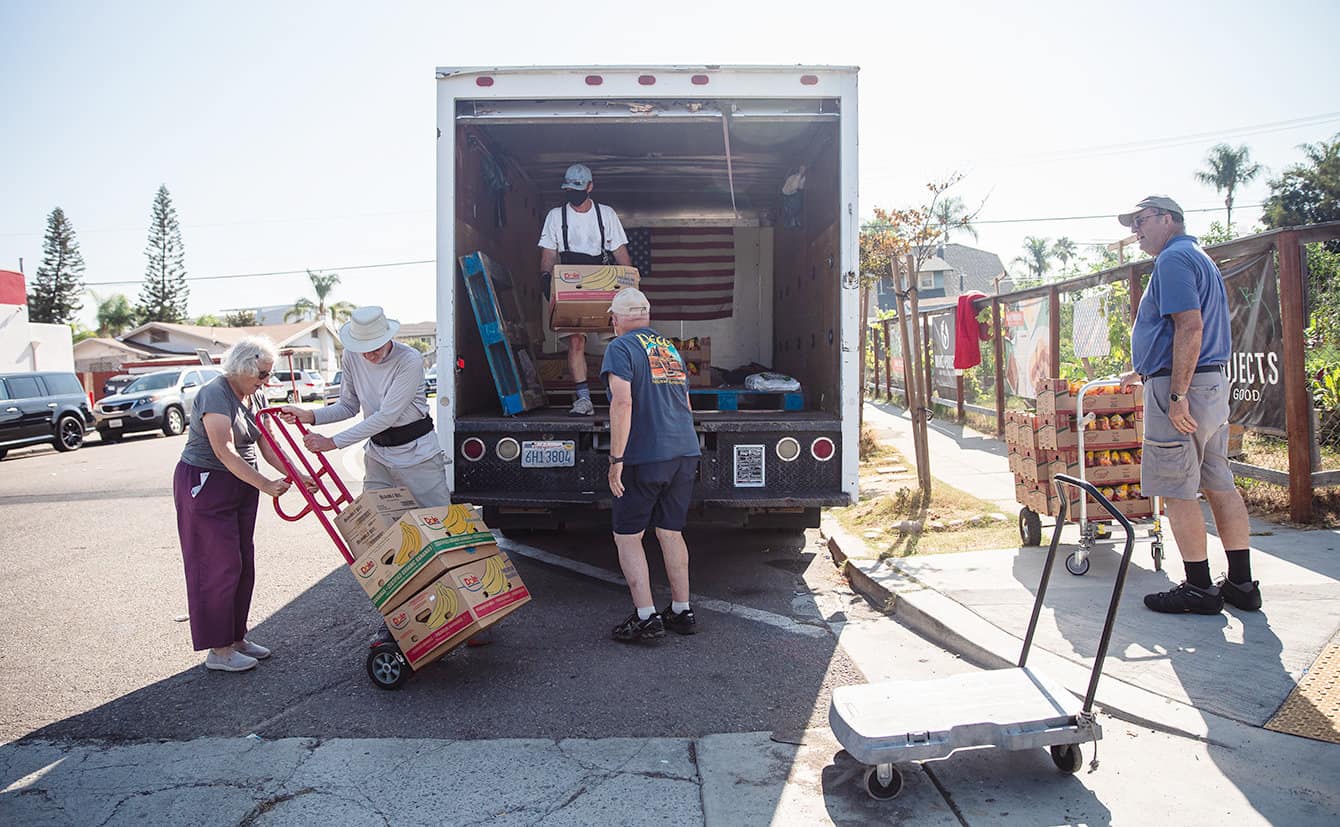
“I think that was very important, because that predisposed us to what happened next,” Montzingo said.
Months later, Montzingo got a phone call from St. James Episcopal Church, located in a coastal San Diego neighborhood known for its wealthy residents and spectacular views of the ocean. A young man named Simon, recently arrived as a refugee from Sudan, had shown up for services at the church.
“He lives closer to you,” Montzingo recalled his colleague telling him.
When Simon met with Montzingo, he told the rector about the long civil war in his country and that more refugees would be coming soon. Many were members of the Anglican Church in Sudan.
“He said, ‘I have a very large family, and many of them will come here, and we will fill this church,’” Montzingo recalled.
Simon’s almost prophetic statement has become legend at St. Luke’s, for that is indeed what happened.
“It was almost as if God’s spirit spoke to me,” Montzingo said.
When was the last time you examined the boundaries of belonging for your church? At this moment, will your congregation choose to see newly arrived Afghan and Haitian refugees as family who belong?
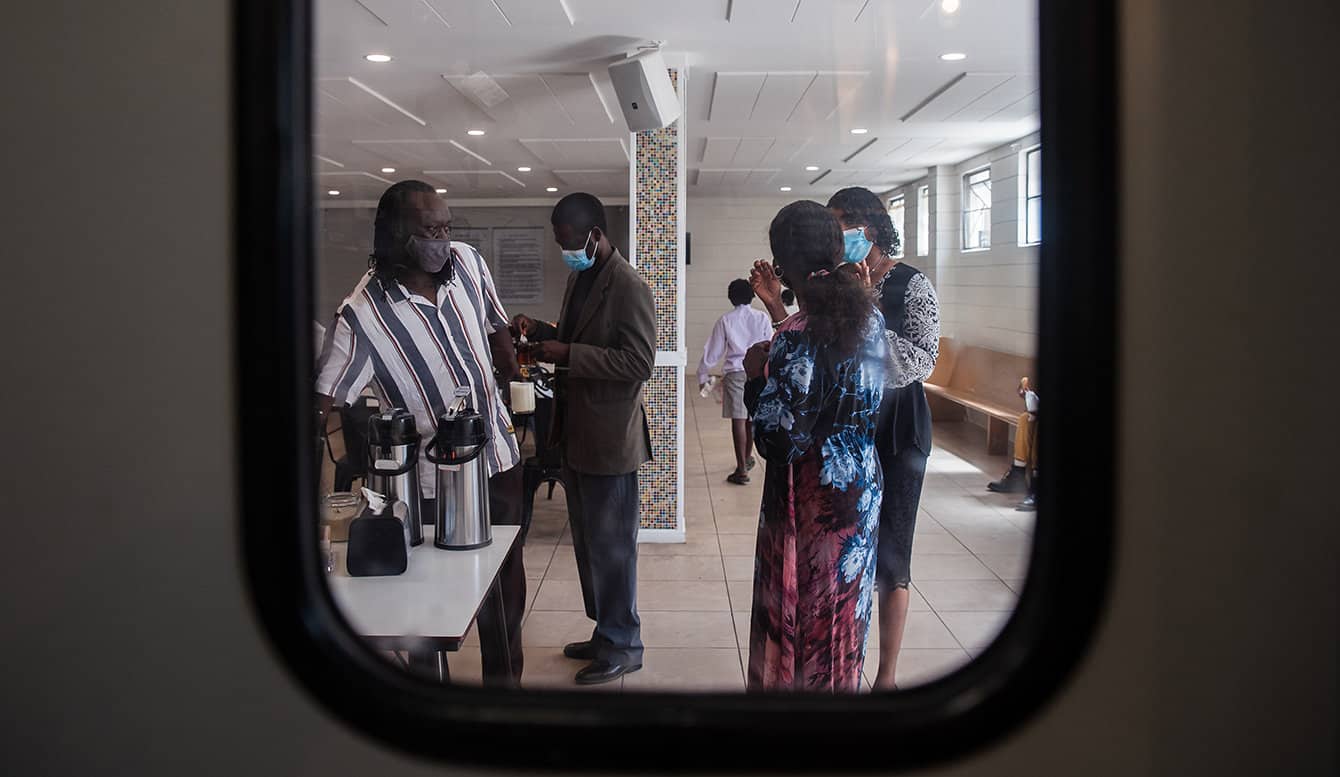
As the church organized to support Sudanese arrivals, leaders began picking up refugees from the San Diego airport to welcome them. The network solidified around a goal of filling the gaps in support provided by resettlement agencies, who receive money from the federal government to help newcomers in their first few months.
In cities like San Diego with a high cost of living, that aid is often not enough to make ends meet even in those first months, and many refugee families continue to struggle long after the help goes away to get fully on their feet.
“[The network] made our life more welcoming, and it took the anxiety away from us,” recalled Katherine Bom, a former refugee from South Sudan and the current executive director of the organization. “It was easier for us to call someone at RefugeeNet who spoke our language and was able to help us.”
Equally important to Montzingo was to provide spiritual support, something that resettlement agencies could not do.
“Refugees have a lot of psychological, emotional and spiritual wounds. These are people who lost their country,” Montzingo said. “They came with a huge sense of loss and that God had turned his back on them.”
For many former refugees, the assistance they received at St. Luke’s was seen as a blessing from God that helped them through those traumas.
Joseph Jok, who now serves on the board of RefugeeNet, still remembers the first pieces of furniture the organization gave to him when he came to San Diego decades ago with his wife and baby — a sofa bed, love seat and table.
“What happened to us through the war, being traumatized — and now you came to this place and you find a community of faith that can support you,” Jok said. “It was a few things they provided, but they were so meaningful.”
Driven by community
To support the newcomers, St. Luke’s set up a refugee office staffed with former refugees.
They provided case management, working with families to understand their needs and offering individualized support.
Those who worked in the office in the 1990s recalled long days and late nights — accompanying refugee families to the grocery store, teaching them how to use ovens, translating for them at doctor visits. It was a round-the-clock operation, especially when a woman went into labor and needed language support at the hospital.
As the network’s reach expanded from Sudanese refugees to a more diverse group of arrivals, the office hired staff from those communities, including Karen refugees from Burma and, more recently, Congolese refugees.
And with more former refugees added to its leadership, the organization’s focus has evolved from supporting through food, furniture and other basic necessities to providing the skills that refugee families will need to survive and thrive on their own.
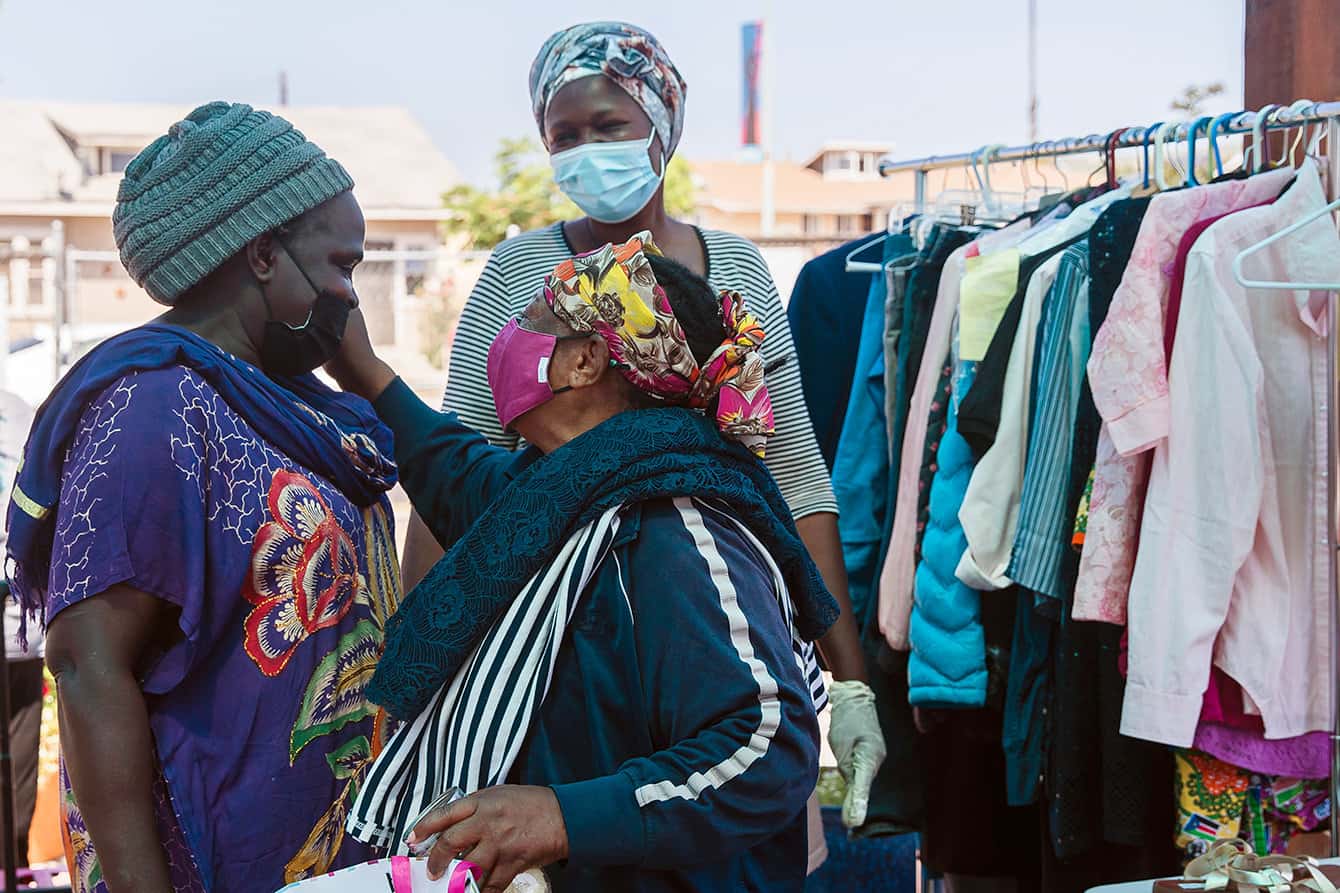
How might sacrificial time and care with refugees who have suffered great trauma help ease their anxiety and ours in this time of the ongoing pandemic?
They help refugees navigate the process of getting ID cards at the Department of Motor Vehicles. They help with resumes and job applications.
Both case managers are also part of the St. Luke’s congregation. Ekyoci grew up as a Catholic but decided to attend St. Luke’s because he could relate to the people there.
“Community, that’s what drives me,” Ekyoci said.
That sense of community and camaraderie is palpable at St. Luke’s and in the work of RefugeeNet.
“The community is left to look after refugees,” Bom said. “The refugees who are served through our program are the ones that refer the new people to us. It’s word-of-mouth.”
Prior to the pandemic, much of their work focused on home visits. While the spread of COVID-19 stalled their ability to provide in-person support, it also amplified the need.
Many former refugees lost their jobs in San Diego’s normally bustling hospitality and tourism sectors when the world shut down. Bom and Ekyoci scrambled to help parents find work and apply for unemployment and rental assistance.
They also reinvigorated RefugeeNet’s weekly food distribution program as the number of struggling families rose.
The longer term
Early in the organization’s history, case managers noticed that many of the families’ children were struggling in school.
Some had incomplete, interrupted education or no formal education at all. For many, language barriers were an issue.
The organization decided to offer tutoring as part of its support services.
Just prior to the pandemic, RefugeeNet tutored about 100 children, Bom said. Since then, the organization has supported about 30 kids, with hopes to grow back to the earlier number.
This summer, RefugeeNet partnered with the local recreation department to provide the children with swimming lessons.
For Montzingo, helping children was especially important, because they generally adapted more easily to their new home than their parents did. That meant they had a greater potential to improve their families’ economic situations.
What resettlement agency is near you? How might your congregation help fill in gaps through simple acts of service accompanied by powerful human encounters?
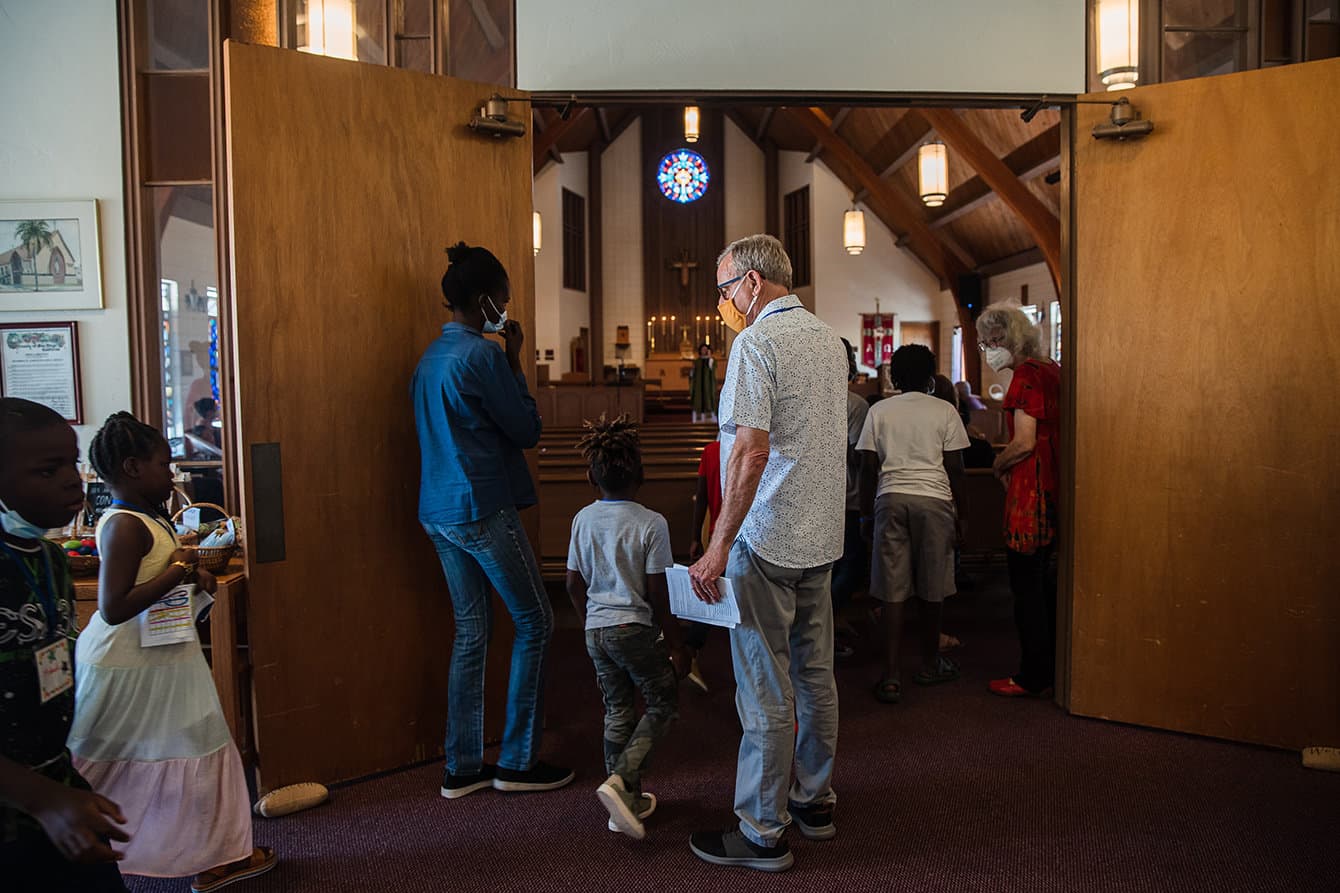
Eventually, RefugeeNet tried to pivot entirely to helping refugee children reach higher education, but that change was not fully implemented before the pandemic hit, when the organization had to shift again.
“I think that was an attempt at responding to what just no longer felt good enough, to just keep meeting basic needs without thinking about the longer term,” Mathewson said of the move toward working on education exclusively.
Jok said it was the involvement of former refugees like him that really pushed RefugeeNet to figure out how to support on a deeper level.
“For many organizations who have good intentions of helping people, sometimes they may miss an element from somebody who is from the same culture who can provide insight,” Jok said. “That’s where I fit in.”
The tutoring program is one of the components he is proudest of, he said.
In recent years, many of the program’s earliest pupils have graduated from college.
“It’s neat to see that happen,” Mathewson said. “Also, it will be interesting to see how that starts to impact families.”
Mama Africa
The idea for a catering business that operates out of St. Luke’s commercial kitchen came from a group of women at the church, where hospitality, an important part of Sudanese culture, was already a key component.
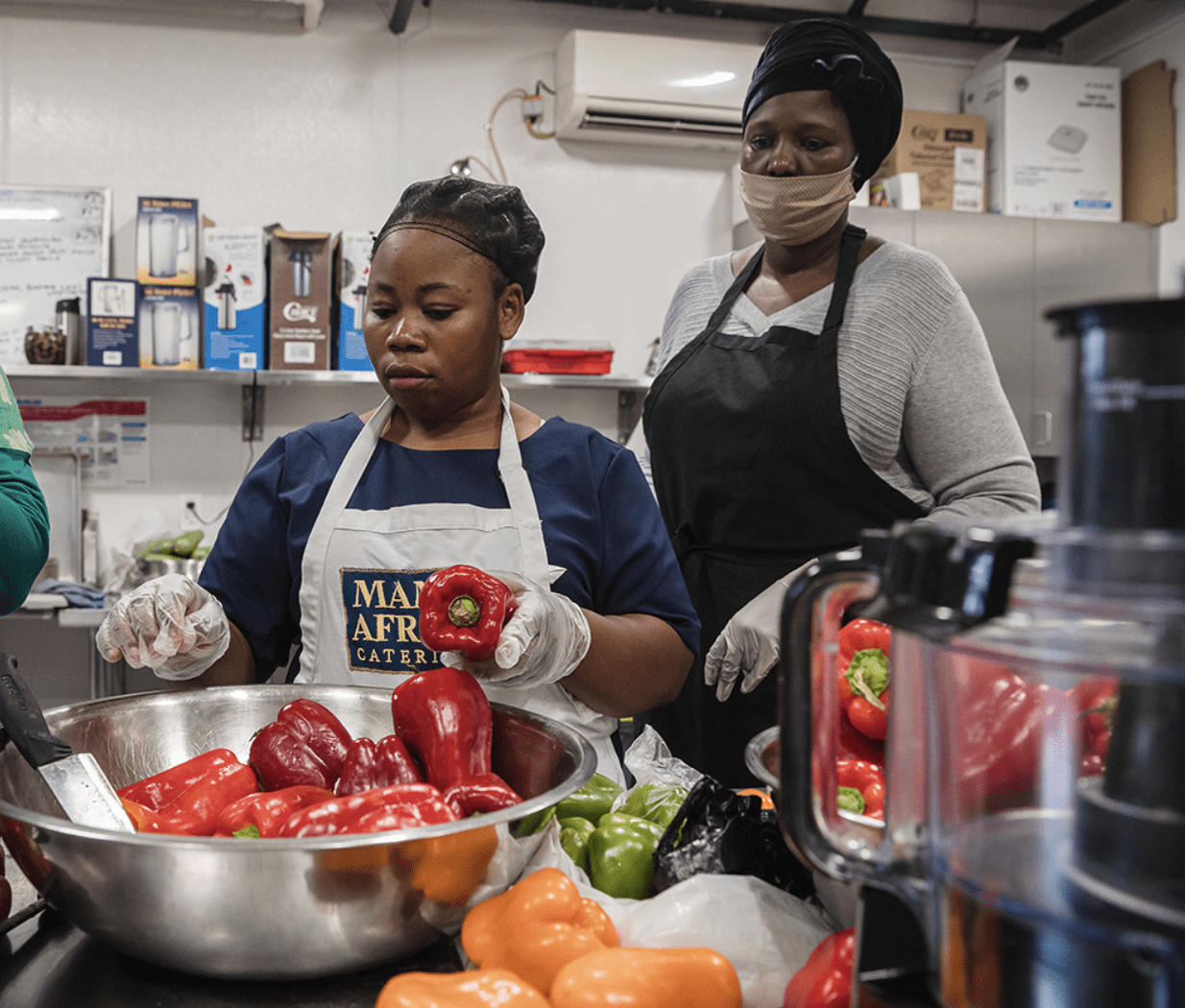
Mama Africa Catering debuted in February, when RefugeeNet hosted its annual gala virtually because of the pandemic. The group made and delivered roughly 85 meals for gala attendees.
Since then, the catering group has sold dinners every Sunday for pickup or delivery in addition to catering special events for the church and providing its post-service snacks.
The Sunday menu changes each week and incorporates meals from several African countries.
Mama Africa offers commercial kitchen training and entrepreneurial skills in addition to the paychecks it provides to the women who work to supplement income from their other jobs.
John, a South Sudanese woman who has been in San Diego for about two years after spending time in a refugee camp in Kenya, said the money she makes working for the catering group supplements her income as a caregiver. She would sometimes be unable to buy food without the additional money, she said.
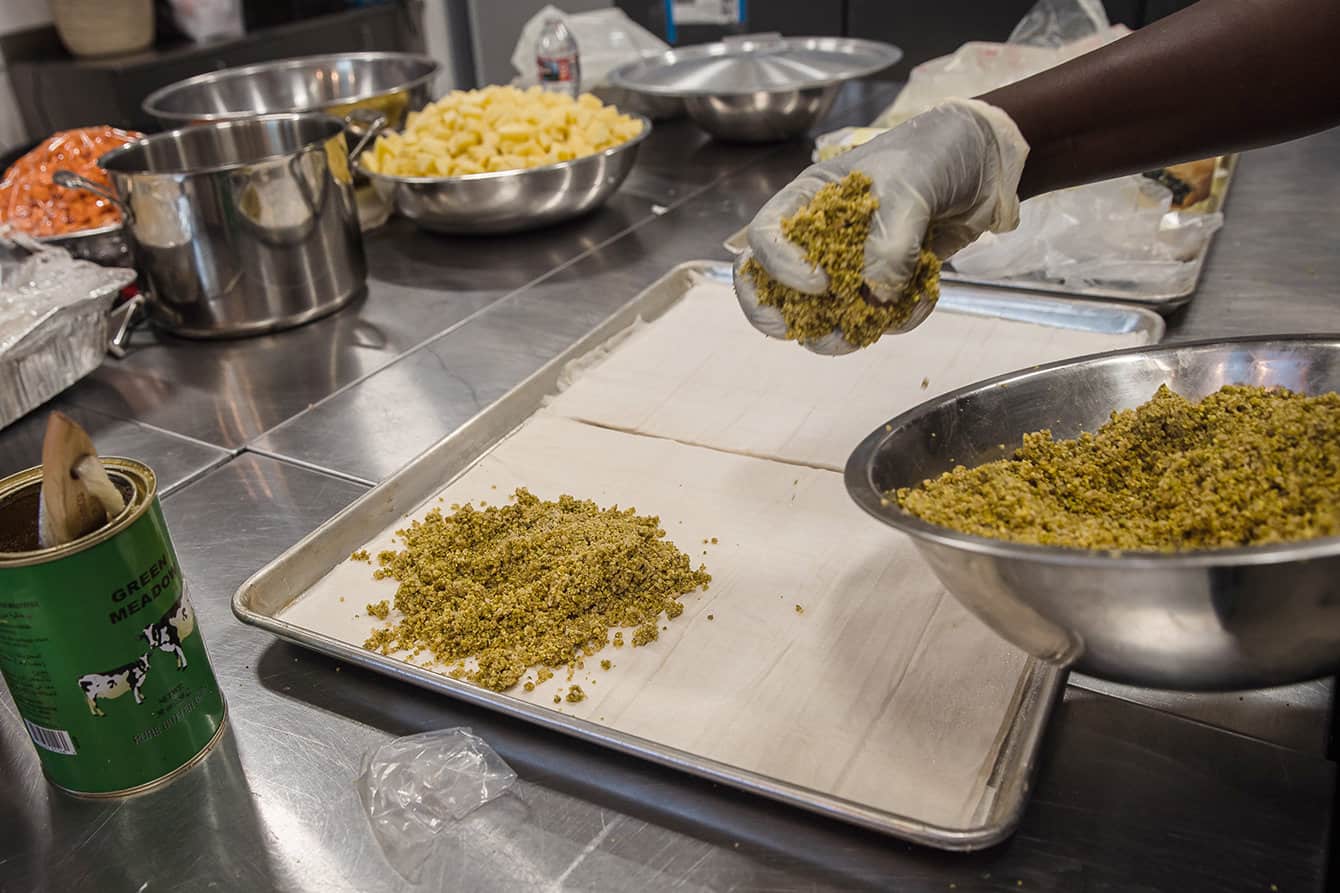
The group of Sudanese and Congolese women preparing the food are led by Siama Agory, a former refugee from South Sudan who was laid off during the pandemic from her job as a server working night shifts in a local casino.
Bom said she was proud to have been able to offer Agory a new job and to see how her fellow church member has grown into the role.
“I’m really blessed to have that opportunity,” Agory said. “It’s not easy to find.”
Agory sees her work with Mama Africa as an extension of her faith and as a way to pay forward the help that she has received over the years from RefugeeNet.
“RefugeeNet was a helping hand for me and my family, and
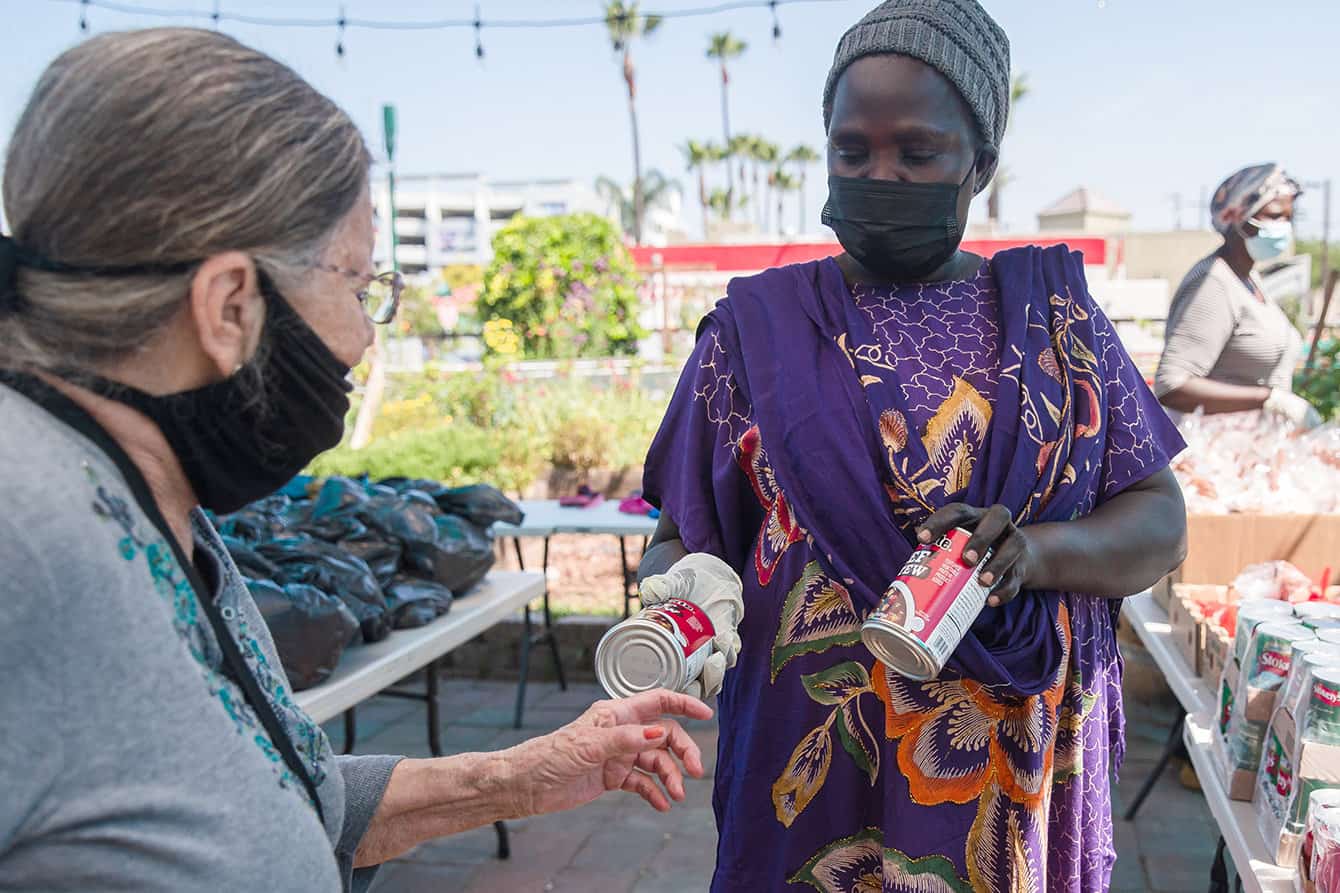
now it’s time to give a helping hand to the newcomers,” Agory said. “I wish I could do more.”
What memories does this story evoke for you or your family? Have you been part of something similar, either welcoming or being welcomed and assisted to live a safer, more fully human life?
Questions to consider
- Imagine the delicious aromas of St. Luke’s coffee hour! What welcoming smells and creative labor can you envision wafting out of your church basement or campus?
- When was the last time you examined the boundaries of belonging for your church? At this moment, will your congregation choose to see newly arrived Afghan and Haitian refugees as family who belong?
- How might sacrificial time and care with refugees who have suffered great trauma help ease their anxiety and ours in this time of the ongoing pandemic?
- What resettlement agency is near you? How might your congregation help fill in gaps through simple acts of service accompanied by powerful human encounters?
- What memories does this story evoke for you or your family? Have you been part of something similar, either welcoming or being welcomed and assisted to live a safer, more fully human life?
(This was first published in Faith & Leadership and appears here by kind permission.)


